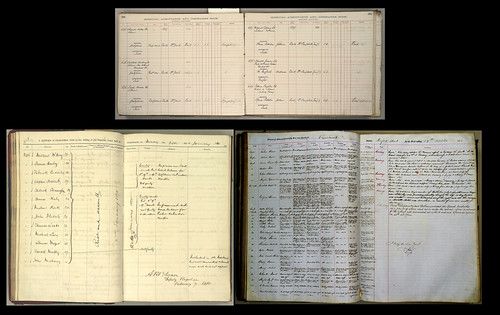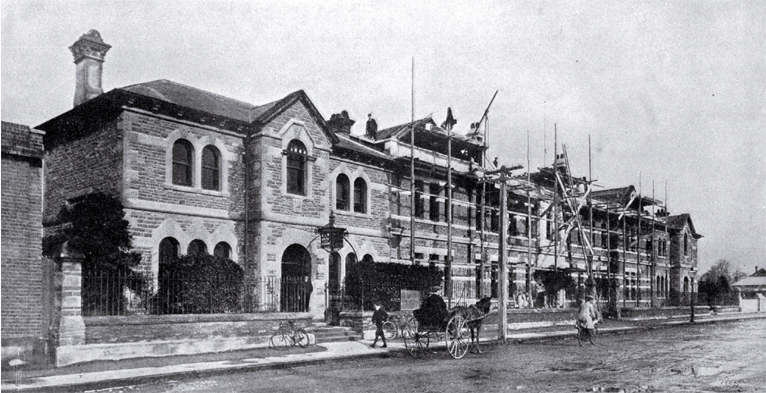Wherever you go, you take your troubles with you.
This was never more apparent than on Boxing Day, 1879, when sectarian violence broke out on the streets of Christchurch and Timaru, between Irish Catholics and Protestant Orangemen.
Although the more severe violence took place in Christchurch, it was actually the Timaru fracas that made it possible.
Prior to Christmas, news had spread throughout the district that the members of Loyal Orange Lodge no. 13 planned to march as part of an annual Boxing Day parade of Friendly Societies. This enraged the Irish Catholics of the area, (of which there were many, one suburb of Timaru being called "Kerrytown" after the home county of its inhabitants) and it became apparent that the parade would not be without incident.
The local constabulary, wishing to control the situation, sent to Christchurch for reinforcements ahead of the parade, leaving the local force in the city depleted. There was also an Orangemen parade planned in Christchurch for the same day but no particularly strong sentiment against it had been expressed and trouble was not expected there. This turned out to be a flawed prediction as violence would indeed break out in front of the Borough Hotel.
On the morning of Boxing Day, in Timaru 40 or so Orangemen gathered before the parade to put on their regalia and "colours". A large group of Irish Catholics (including my own great-great-grandfather, Jeremiah Kelly, then a youthful 22 year-old) left the Hiberian Hotel that morning intent on preventing the Orangemen from marching. The number grew when the train from Waimate arrived with further protestors. Even with reinforcements the police were hugely outnumbered. Even so there appears to have been jostling and shouting and a refusal to disperse but no one was seriously injured. The Orangemen were prevented from marching, the Catholics did their own impromptu "victory parade" through town and then got the train home in the evening.
No arrests were made on the day but my great-great-grandfather and a number of other men considered "ringleaders" were arrested several days later and held under armed guard. The case was heard before the Magistrate on New Years Eve and trial was set for March the following year.
Several men were let off (my great-great-grandfather included, possibly thanks to the testimony of the local Inspector of police who, according to a newspaper account said "I saw Kelly there. He was in front of the mob. I did not see him do anything").
Six men were eventually found guilty on charges of rioting and violent assault and were subject to good behaviour bonds. None were jailed and the Hotel proprietor, Thomas O'Driscoll, who appears to have had a hand in organising the protest, was fined £100.
Thomas Bracken, aka the lyricist of God Defend New Zealand (under the pen name Paddy Murphy) even wrote a poem about the stoush called The Saige o Timaru, seemingly poking fun at the possibly grandiose ambitions of those involved, comparing it to battles of the ancient world like Troy or "Throy".
Look here, be jabers, me dacint naybors,
Ther soords an' sabers will niver do,
It's no use talkin' we'll stop their walkin',
Ther colour hawkin' through Timaru.

The procession was already underway when a group of navvies, who had gathered down an alley adjacent to the hotel and were armed with pick-handles and other weapons, attacked the Orangemen as they passed the Borough. With few policemen available to attend the riot it was a struggle to get under control and five Orangemen were injured and sent to hospital as a result of the fracas.
As news of the attack spread hostility towards the hotel grew and an angry crowd gathered, which at its peak was between 3000 and 4000 people. The mayor was forced to swear in 250 special constables to help keep the peace but a crowd remained over the course of the next day and it wasn't until the following night that the constables were able to be dismissed.
Four rioters were arrested on Boxing Day, with a further 14 arrested in the days following. On 2 January their cases were heard at the district court and five were dismissed. Of the remaining men, 11 were convicted. All, save four considered most responsible who got 18 months, were given 12 months hard labour.
In each case the politics and animosity of opposing factions had survived the long journey to the other side of the world to find root in New Zealand soil.
For more about the 1879 Boxing Day riots -
- Newspapers of the day report on Timaru and Christchurch riots
- Violence breaks out between Irish Catholics and Protestant Orangemen NZ History
- The Timaru Orange riots, 1879 Te Ara
- The Orange and Green riot, 26th December 1879 Peeling back history
- The 'Battle of the Borough' and the 'Saige o Timaru': Sectarian Riot in Colonial Canterbury, by Sean Brosnahan, NZ Journal of History, 1994 Volume 28, No.1





Add a comment to: The Troubles – Boxing Day, 1879